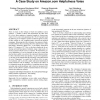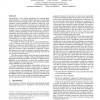427 search results - page 70 / 86 » Inductive reasoning about effectful data types |
ASPLOS
2011
ACM
12 years 11 months ago
2011
ACM
nt, user-defined objects present an attractive abstraction for working with non-volatile program state. However, the slow speed of persistent storage (i.e., disk) has restricted ...
POPL
2010
ACM
14 years 4 months ago
2010
ACM
Concurrent programming errors arise when threads share data incorrectly. Programmers often avoid these errors by using synchronization to enforce a simple ownership policy: data i...
CORR
2002
Springer
13 years 7 months ago
2002
Springer
for data abstraction and justifies reasoning by simulation. Representation independence has been shown for a variety of languages and constructs but not for shared references to mu...
WWW
2009
ACM
14 years 8 months ago
2009
ACM
There are many on-line settings in which users publicly express opinions. A number of these offer mechanisms for other users to evaluate these opinions; a canonical example is Ama...
PLDI
2012
ACM
11 years 10 months ago
2012
ACM
Linearizability is a key design methodology for reasoning about tations of concurrent abstract data types in both shared memory and message passing systems. It provides the illusi...


